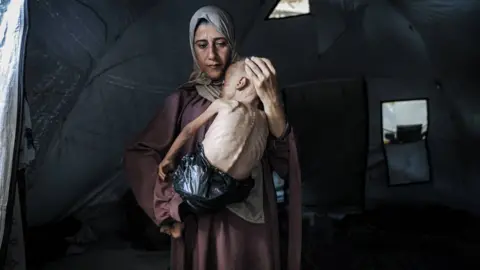The humanitarian situation in Gaza has deteriorated alarmingly, prompting over 100 international aid organizations and human rights groups to issue a stark warning about mass starvation. Among the prominent organizations involved in this distressing statement are Médecins Sans Frontières (MSF), Save the Children, and Oxfam. In their collective message, they highlighted that both their colleagues and the local populace are “wasting away,” a dire reflection of the catastrophic conditions faced by the residents of Gaza.
As tension rises, Israel, which controls the movement of all supplies into the territory, dismissed the claims made by these organizations, accusing them of propagating narratives favorable to Hamas, the political and militant organization governing Gaza. The urgency of their warning is underscored by the latest reports from the Hamas-run health ministry, which stated that in recent 24 hours alone, another ten Palestinians succumbed to malnutrition. This brought the total number of such deaths to an alarming 43 since the previous Sunday, as reported by health officials, revealing a harrowing trend of increasing mortality due to starvation.
Compounding this crisis, the United Nations has reported an alarming rise in the number of individuals admitted to hospitals suffering from extreme exhaustion due to severe food scarcity. Many others are collapsing in the streets from hunger. The scale of the crisis aligns with a sobering acknowledgment from humanitarian groups that aid workers themselves are frequently joining the lines for food, risking their lives in a desperate bid to feed their families. The situation has reached a point where humanitarian workers are witnessing their colleagues deteriorate before their very eyes as supplies have been relentlessly depleted.
In March, Israel enacted a total blockade on aid deliveries to Gaza, launching a renewed military offensive against Hamas shortly thereafter, thus shattering a two-month ceasefire. Meanwhile, despite some easing of the blockade over recent months, conditions have only worsened, leading to severe shortages of food, medical supplies, and fuel. This dire situation has resulted in reported rates of acute malnutrition unprecedentedly high, particularly among vulnerable populations such as children and the elderly. Diseases like acute watery diarrhea are reportedly spreading throughout the territory, where many marketplaces lie empty and waste accumulates due to a lack of resources.
Testimonials from those on the ground further illustrate the gravity of the situation. One aid worker, providing psychosocial support to distressed families, shared a heart-wrenching account of children expressing a desire to “go to heaven,” perceiving it as a place where food is available. The indications of mass starvation have garnered attention from global organizations, with the World Health Organization (WHO) stating that a quarter of Gaza’s population is living in famine-like conditions, affecting a staggering number of almost 100,000 women and children who require immediate intervention for severe acute malnutrition.
Dr. Tedros Adhanom Ghebreyesus, the WHO’s director, emphasized unequivocally that the crisis at hand is man-made; a product of the ongoing blockade which has significantly impeded access to vital supplies. Local pediatric medical professionals, like Dr. Ahmad al-Farra, acknowledged that food shortages have reached such critical levels that children have gone days without food, leading to varying degrees of starvation, and sadly, many succumbed to preventable issues despite medical intervention.
The economic landscape in Gaza has also been devastated, with soaring prices for basic commodities rendering food unaffordable for many families. A typical resident highlighted that 300 shekels (approximately $90) are now required daily just to buy flour, which exemplifies the severe economic strain being experienced.
While the Israeli military downplays these reports of starvation, the UN and humanitarian agencies contest these narratives, providing data indicating that the blockade severely limits the movement and distribution of humanitarian aid. The continual military engagement and challenges such as road damage and shortages of fuel only exacerbate the complexities of delivering aid, leading to a humanitarian crisis that appears to be worsening by the day.
The organizations advocating for the people of Gaza called on governments around the world to take concrete actions to ameliorate the crisis. They urged the implementation of an immediate and unconditional ceasefire, the lifting of bureaucratic and logistical barriers, the opening of all crossings for aid delivery, and a return to a principled, UN-led humanitarian response. The statements from these international bodies depict the dire necessity for urgent intervention as the people of Gaza grapple with the consequences of prolonged conflict and blockade.












